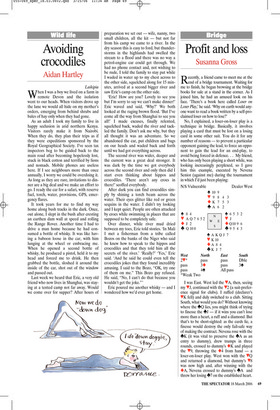Avoiding crocodiles
Aidan Hartley
Laikipia
When I was a boy we lived on a farm in remote Devon and the isolation went to our heads. When visitors drove up the lane we would all hide on my mother’s orders, emerging from behind shrubs and bales of hay only when they had gone.
As an adult I took my family to live in happy seclusion in arid northern Kenya. Visitors rarely make it from Nairobi. When they do, they plan their trips as if they were expeditions sponsored by the Royal Geographical Society. I’ve seen tax inspectors beg to be guided back to the main road after becoming hopelessly lost, stuck in black cotton and terrified by lions and nomads. Mobile phones are useless here. If I see neighbours more than once annually, I worry we could be overdoing it. As long as they are rare, invitations to dinner are a big deal and we make an effort to go. I ready the car for a safari, with reserve fuel, torch, water, provisions, GPS, emergency flares.
It took years for me to find my way home along bush tracks in the dark. Once, out alone, I slept in the bush after cresting an earthen dam wall at speed and rolling the Range Rover. Another time I had to drive a man home because he had consumed a bottle of whisky. It was like having a baboon loose in the car, with him lunging at the wheel or embracing me. When he opened a second bottle of whisky, he produced a pistol, held it to my head and forced me to drink. He then grabbed the bottle, sloshed it around the inside of the car, shot out of the window and passed out.
Last week we heard that Eric, a very old friend who now lives in Shanghai, was staying at a tented camp not far away. Would we come over for supper? After hours of preparation we set out — wife, nanny, two small children, all the kit — but not far from his camp we came to a river. In the dry season this is easy to ford, but thunderstorms in the highlands had swelled the stream to a flood and there was no way a petrol-engine car could get through. We had no phone contact and, not wishing to be rude, I told the family to stay put while I waded in water up to my chest across to the other side, squelched along for 15 minutes, arrived at a second bigger river and saw Eric’s camp on the other side.
‘Eric! How are you? Lovely to see you but I’m sorry to say we can’t make dinner!’ Eric waved and said, ‘Why?’ We both looked at the raging brown flood. ‘But I’ve come all the way from Shanghai to see you all!’ I made excuses, finally relented, squelched back, waded the river and tackled the family. Don’t ask me why, but they all thought it was an adventure. So we abandoned the car, put children and bags on our heads and waded back and forth until we had got everything across.
The second river was wider, deeper and the current was a great deal stronger. It was dark by the time we got everybody across the second river and only then did I start even thinking about hippos and crocodiles. ‘There aren’t any crocs in there!’ scoffed everybody.
After dark you can find crocodiles simply by shining a torch beam across the water. Their eyes glitter like red or green sequins in the water. I didn’t try looking and I kept quiet. People are often attacked by crocs while swimming in places that are supposed to be completely safe.
Over dinner, while river mud dried between my toes, Eric told stories. ‘In Mali I met a fisherman from a tribe called Bozos on the banks of the Niger who said he knew how to speak to the hippos and crocodiles and that they told him all the secrets of the river.’ ‘Really?’ ‘Yes,’ Eric said. ‘And he said he could even tell the crocodiles jokes that they found incredibly amusing. I said to the Bozo, “OK, try one of them on me.” This Bozo guy refused. He said, “No, I can’t do that because you wouldn’t get the joke.”’ Eric poured me another whisky — and I wondered how we’d ever get home.


















































































 Previous page
Previous page